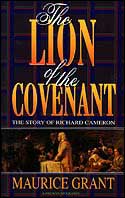Even in the best of times the relationship between Church and State has always been uneasy. While the idea of a Christian state is lauded and is ultimately what we must struggle for, the fact remains that the State has more often than not been the enemy of the church. Even more diabolical, however, is when the ecclesiastical establishment allies with the State and it, too, becomes an enemy to the people of God. So it was in Richard Cameron’s day.
Maurice Grant does a fine job in quickly and deftly explaining the context of the Cromwellian period and afterward. Of particular note is the controversy between the Protestors and Resolutioners, the former rejecting any compromise of Jesus’ crown rights over his church. The flow of the story parallels Richard Cameron’s own life. It starts small and remains uneventful for quite some time. Grant treats his readers to the intricate details of Cameron’s own development, his turbulent ministry, and his climactic (and prophetic) death.
More importantly, however, are the issues around which Cameron fought. If the civil magistrate proclaims himself head of the church, and thus blurs the distinction between Church and State, is it logically possible to resist him only in the realm of the church but leave him be in the realm of the State. Cameron’s critics and moderate Presbyterians today say yes. Cameron said no. The Stuart monarchs also said no. One is reminded of Jesus’s statement that the children of this world are wiser than the children of light.
Cameron represents something of an embarrassment for the modern Reformed establishment. On one hand, he was a Covenanting martyr. Further, he fully identified himself with the best of the Scottish Reformation. Therefore, if you disagree with Cameron you disagree with the essence of what it means to be Presbyterian. On the other hand, unfortunately for modern Reformed seminaries, Cameron advocated a theocratic republic based on Moses’ judicials.
Even worse for the bourgeoisie Reformed, Cameron’s very martyrdom is complicated by the fact that he had pistol and sword in hand when martyred! (Of course, this doesn’t bother me at all. I think it is awesome). Even more embarrassing, Richard Cameron correctly prophecied many times: he prophecied the deaths of several specific sinners and he prophecied that a Stuart king would never again be crowned in Scotland; making the previous even more interesting, James II, while crowned in England, lost his crown before he came to Scotland! Or maybe it was Cargill who prophecied that. My point is the same).
So what should we do?
I am not uncritical of Cameron, though. I agree with his taking arms against thugs who happened to have been deputized by a foreign power. That is Lex, Rex plain and simple. Grant is correct, though, that Cameron had not thought out the issues as thoroughly as his friend Donald Cargill had. The Scottish Reformation championed the idea of armed resistance to a king. But it still saw the king as king. Disowning a king, however, runs very close to the Romanist concept of a pope deposing kings as he saw fit. Cameron could have justified his actions with far more powerful arguments by relying much more closely on Rutherford.
Should we, likewise, resist tyrannical rulers? Well, it depends. Our situation is not analagous to Cameron’s, though one suspects the we live in a secular Erastianism. Cameron was fully justified in resistance because by culture, tradition, and prior law he was bound to uphold the Covenants.

No comments:
Post a Comment